介词
40个英语介词用法总结
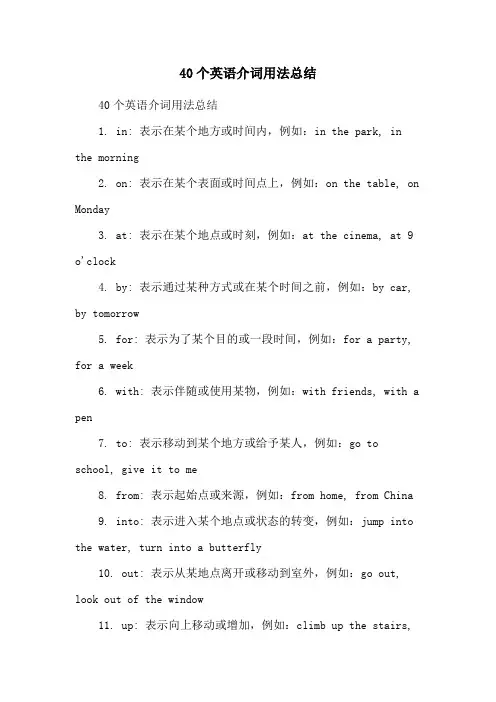
40个英语介词用法总结40个英语介词用法总结1. in: 表示在某个地方或时间内,例如:in the park, in the morning2. on: 表示在某个表面或时间点上,例如:on the table, on Monday3. at: 表示在某个地点或时刻,例如:at the cinema, at 9 o'clock4. by: 表示通过某种方式或在某个时间之前,例如:by car, by tomorrow5. for: 表示为了某个目的或一段时间,例如:for a party, for a week6. with: 表示伴随或使用某物,例如:with friends, with a pen7. to: 表示移动到某个地方或给予某人,例如:go to school, give it to me8. from: 表示起始点或来源,例如:from home, from China9. into: 表示进入某个地点或状态的转变,例如:jump into the water, turn into a butterfly10. out: 表示从某地点离开或移动到室外,例如:go out, look out of the window11. up: 表示向上移动或增加,例如:climb up the stairs,wake up12. down: 表示向下移动或减少,例如:walk down the hill, calm down13. about: 表示关于某事或在某个范围内,例如:talk about the movie, wander about the city14. off: 表示离开或关闭,例如:get off the bus, turnoff the lights15. on: 表示打开或激活,例如:turn on the TV, switch on the computer16. over: 表示越过或在某地上方,例如:jump over the fence, fly over the city17. under: 表示在某物下面或被控制或影响,例如:hide under the bed, live under his rules18. with: 表示具有某种特征或和某人一起做某事,例如:a man with blue eyes, dance with me19. without: 表示没有某物或在缺乏某物的情况下,例如:go without food, live without regret20. by: 表示通过某种方式,例如:learn by doing, go by bus21. through: 表示穿过某物或完成某事,例如:walk through the door, go through the documents22. across: 表示横穿某物或在某个范围内,例如:swimacross the river, all across the world23. between: 表示在两个事物之间或在某个时间段,例如:choose between two options, between 9 and 10 o'clock24. among: 表示在三个或三个以上事物之间或在某群人中,例如:share among friends, discuss among colleagues25. around: 表示在周围或在某个时间点附近,例如:walk around the park, around midnight26. through: 表示通过某事物或在某段时间内,例如:read through the book, work through the night27. against: 表示反对或靠在某物上,例如:fight against injustice, lean against the wall28. for: 表示代表或支持某人或某事,例如:vote for a candidate, fight for freedom29. towards: 表示朝向某个方向或对某人有好感,例如:walk towards the beach, feel towards someone30. within: 表示在某个时间或范围内,例如:arrive within an hour, within the city limits31. beyond: 表示超出某个界限或超过某个程度,例如:beyond expectations, beyond the horizon32. along: 表示沿着某个路线或伴随某人一起,例如:walk along the street, sing along with the song33. above: 表示在某物之上或高于某个程度,例如:flyabove the clouds, above average34. below: 表示在某物之下或低于某个程度,例如:swim below the surface, below freezing35. beside: 表示在某物旁边或和某人一起,例如:sit beside me, beside the lake36. near: 表示在某物附近或接近某个时间,例如:live near the beach, near the end37. past: 表示经过某个地点或在某个时间之后,例如:walk past the store, past midnight38. around: 表示在周围或大约某个数量,例如:look around the room, around 20 people39. after: 表示在某个时间之后或追求某人或某事,例如:after dinner, run after the dog40. before: 表示在某个时间之前或在某个事件之前,例如:before sunrise, before the meeting这些介词是英语中常用的一些基本介词,它们在表达地点、时间、方式等方面起到了重要的作用。
常见的介词大全
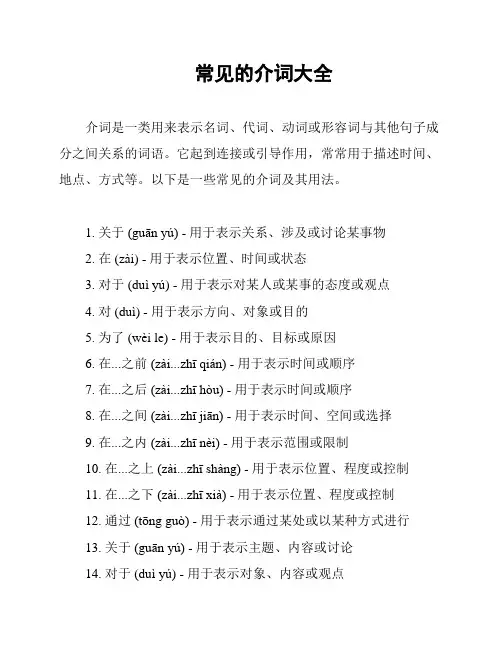
常见的介词大全介词是一类用来表示名词、代词、动词或形容词与其他句子成分之间关系的词语。
它起到连接或引导作用,常常用于描述时间、地点、方式等。
以下是一些常见的介词及其用法。
1. 关于(guān yú) - 用于表示关系、涉及或讨论某事物2. 在 (zài) - 用于表示位置、时间或状态3. 对于 (duì yú) - 用于表示对某人或某事的态度或观点4. 对 (duì) - 用于表示方向、对象或目的5. 为了 (wèi le) - 用于表示目的、目标或原因6. 在...之前(zài...zhī qián) - 用于表示时间或顺序7. 在...之后(zài...zhī hòu) - 用于表示时间或顺序8. 在...之间(zài...zhī jiān) - 用于表示时间、空间或选择9. 在...之内(zài...zhī nèi) - 用于表示范围或限制10. 在...之上(zài...zhī shàng) - 用于表示位置、程度或控制11. 在...之下(zài...zhī xià) - 用于表示位置、程度或控制12. 通过(tōng guò) - 用于表示通过某处或以某种方式进行13. 关于(guān yú) - 用于表示主题、内容或讨论14. 对于 (duì yú) - 用于表示对象、内容或观点15. 针对(zhēn duì) - 用于表示目标或针对特定情况16. 根据(gēn jù) - 用于表示依据、基础或原因17. 按照 (àn zhào) - 用于表示照着顺序、方法或规则18. 跟随(gēn suí) - 用于表示后继或紧随19. 靠近 (kào jìn) - 用于表示接近或附近20. 近 (jìn) - 用于表示时间、距离或关系请注意,以上只是一些常见的介词,还有许多其他介词可根据具体语境来使用。
介词
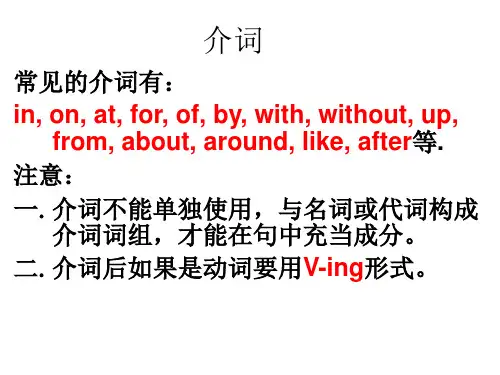
三. 表示方位的介词 二)over, under, above, below的区别 1. over “在…正上方(垂直)”,也可以指 覆盖,“在…上面”,反义词是under. eg: There is a bridge over the river. 2. under “在…正下方(垂直)” 。 eg:The cat is sleeping under the table. 3. above“在…的下面,低于…”,不一定垂 直,反义词是below。
except, except for
except 同类中“除了。。。之外” except for 非同类中“除了。。。之外” (整体肯定,局部修正) The shop is open everyday except Sunday. He is a handsome guy except for a little fat. Your writing is good except for a few grammar.
七.固定搭配的介词短语 四)动词+形容词+介词 be afraid of, be angry with, be able to, be good at, be good for, be proud of, be famous for, be late for, be full of, be filled with, be interested in, be pleased with, be different from, est.
二)after, in 的区别 1. in +一段时间,表示将来的一段时间之后, 用于将来时。 2. After+一段时间 表示过去的一段时间之后, 用于过去时。 如果after 后跟将来的某一个时刻,也可 以用于将来时。 in eg:He will come back_____a week. after a week. He came back ____ after 5 o’clock. He will come back _____
介词大全
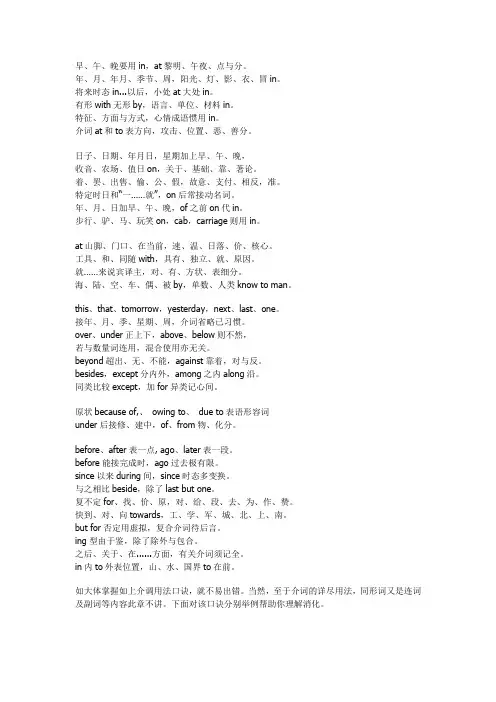
早、午、晚要用in,at黎明、午夜、点与分。
年、月、年月、季节、周,阳光、灯、影、衣、冒in。
将来时态in...以后,小处at大处in。
有形with无形by,语言、单位、材料in。
特征、方面与方式,心情成语惯用in。
介词at和to表方向,攻击、位置、恶、善分。
日子、日期、年月日,星期加上早、午、晚,收音、农场、值日on,关于、基础、靠、著论。
着、罢、出售、偷、公、假,故意、支付、相反,准。
特定时日和“一……就”,on后常接动名词。
年、月、日加早、午、晚,of之前on代in。
步行、驴、马、玩笑on,cab,carriage则用in。
at山脚、门口、在当前,速、温、日落、价、核心。
工具、和、同随with,具有、独立、就、原因。
就……来说宾译主,对、有、方状、表细分。
海、陆、空、车、偶、被by,单数、人类know to man。
this、that、tomorrow,yesterday,next、last、one。
接年、月、季、星期、周,介词省略已习惯。
over、under正上下,above、below则不然,若与数量词连用,混合使用亦无关。
beyond超出、无、不能,against靠着,对与反。
besides,except分内外,among之内along沿。
同类比较except,加for异类记心间。
原状because of,、owing to、due to表语形容词under后接修、建中,of、from物、化分。
before、after表一点, ago、later表一段。
before能接完成时,ago过去极有限。
since以来during间,since时态多变换。
与之相比beside,除了last but one。
复不定for、找、价、原,对、给、段、去、为、作、赞。
快到、对、向towards,工、学、军、城、北、上、南。
but for否定用虚拟,复合介词待后言。
ing型由于鉴,除了除外与包合。
之后、关于、在......方面,有关介词须记全。
常用介词归纳
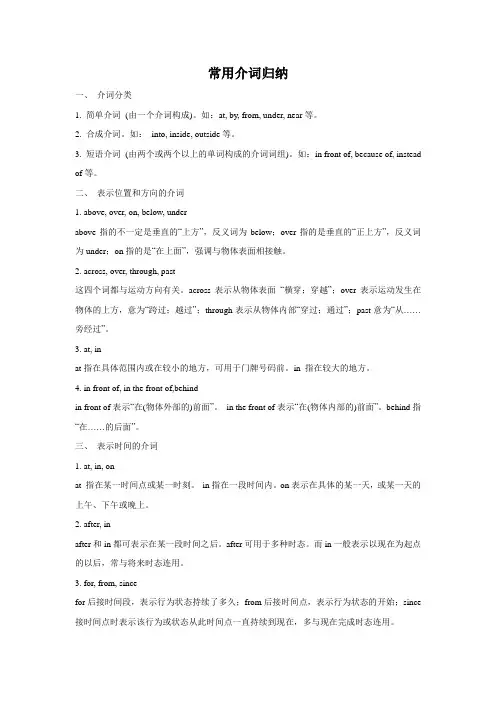
常用介词归纳一、介词分类1. 简单介词(由一个介词构成)。
如:at, by, from, under, near等。
2. 合成介词。
如:into, inside, outside等。
3. 短语介词(由两个或两个以上的单词构成的介词词组)。
如:in front of, because of, instead of等。
二、表示位置和方向的介词1. above, over, on, below, underabove指的不一定是垂直的“上方”,反义词为below;over指的是垂直的“正上方”,反义词为under;on指的是“在上面”,强调与物体表面相接触。
2. across, over, through, past这四个词都与运动方向有关。
across表示从物体表面“横穿;穿越”;over表示运动发生在物体的上方,意为“跨过;越过”;through表示从物体内部“穿过;通过”;past意为“从……旁经过”。
3. at, inat指在具体范围内或在较小的地方,可用于门牌号码前。
in 指在较大的地方。
4. in front of, in the front of,behindin front of表示“在(物体外部的)前面”。
in the front of表示“在(物体内部的)前面”。
behind指“在……的后面”。
三、表示时间的介词1. at, in, onat 指在某一时间点或某一时刻。
in指在一段时间内。
on表示在具体的某一天,或某一天的上午、下午或晚上。
2. after, inafter和in都可表示在某一段时间之后。
after可用于多种时态。
而in一般表示以现在为起点的以后,常与将来时态连用。
3. for, from, sincefor后接时间段,表示行为状态持续了多久;from后接时间点,表示行为状态的开始;since 接时间点时表示该行为或状态从此时间点一直持续到现在,多与现在完成时态连用。
介词大全
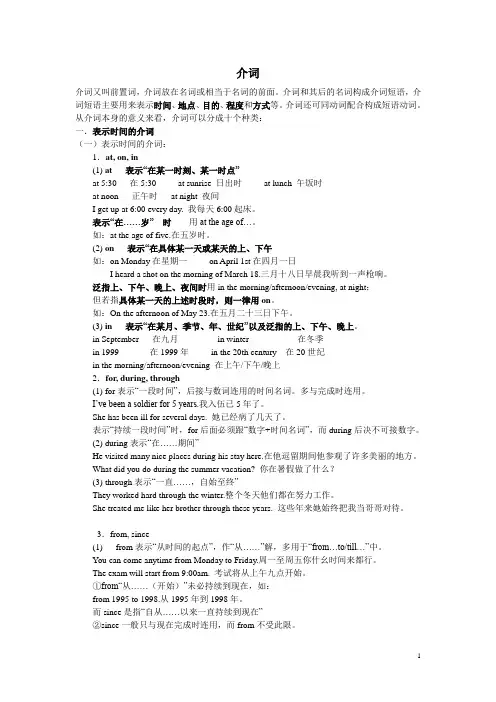
介词介词又叫前置词,介词放在名词或相当于名词的前面。
介词和其后的名词构成介词短语,介词短语主要用来表示时间、地点、目的、程度和方式等。
介词还可同动词配合构成短语动词。
从介词本身的意义来看,介词可以分成十个种类:一.表示时间的介词(一)表示时间的介词:1.at, on, in(1) at 表示“在某一时刻、某一时点”at 5:30在5:30at sunrise 日出时at lunch 午饭时at noon正午时at night 夜间I get up at 6:00 every day. 我每天6:00起床。
表示“在……岁”时用at the age of…。
如:at the age of five.在五岁时。
(2) on 表示“在具体某一天或某天的上、下午如:on Monday在星期一on April 1st在四月一日I heard a shot on the morning of March 18.三月十八日早晨我听到一声枪响。
泛指上、下午、晚上、夜间时用in the morning/afternoon/evening, at night;但若指具体某一天的上述时段时,则一律用on。
如:On the afternoon of May 23.在五月二十三日下午。
(3) in 表示“在某月、季节、年、世纪”以及泛指的上、下午、晚上。
in September在九月in winter在冬季in 1999 在1999年in the 20th century在20世纪in the morning/afternoon/evening 在上午/下午/晚上2.for, during, through(1) for表示“一段时间”,后接与数词连用的时间名词。
多与完成时连用。
I’ve been a soldier for 5 years.我入伍已5年了。
She has been ill for several days. 她已经病了几天了。
(完整版)汉语介词分类
介词的分类(1)表示时间方向的介词:从、自、自从、于、打、到、往、在、当、朝、向、顺着、沿着、随着(2)表示方式的介词:按、照、按照、依、依照、本着、经过、通过、根据、以、凭(3)表示目的的介词:为、为了、为着(4)表示原因的介词:因、由于、因为(5)表示对象,范围的介词:对、对于、把、向、跟、与、同、给、关于(6)表示排除的介词:除、除了、除去、除非(7)表示被动的介词:被、叫、让、给(8)表示比较的介词:比、和、同上述介词中的"着,了,过" 是语素,不是动态助词.3,介词与动词的区别现代汉语的介词大多数是从古代汉语演变而来的,有些词还兼有介词和动词两种功能.如"在,为,比,到,给,朝,经过,通过"等.他为谁,为大家.(动词)我们为人民服务. (介词)学校的大门朝南.(动词)学校的大门朝南开着.(介词)今天我们比乒乓球.(动词)你比他强.(介词)计划通过了.(动词)通过学习,我们提高了认识.(介词)二者的区别在于:动词能肯定否定相叠表示疑问,介词不能.他在不在宿舍(动词)他在黑板上写了几个字.("在"为介词,不能改为"在不在")(2)"X+宾"的前后是否有别的动词,若有别的动词,"X"是介词;若没有别的动词,"X"是动词.如:火车到站了.(动词)火车到十一点钟才进站.(介词)他在宿舍.(动词)他在宿舍住.(介词)他住在宿舍.(介词)大部分动词能带动态助词"了",介词不能.汽车经过了大桥.(动词)经过认真的考虑,他决定到新疆去.(介词)他给了我一本书.(动词)他给我买了一本书.(介词)简单的说,介词就介绍对象和句子其他部分的关系的。
比如:在,和,跟,从,除了,为了,关于,根据……等等现代汉语-副词的种类副词常修饰、限制动词或形容词性词语,表示程度、范围、时间等意义:程度副词:很、最、极、挺、太、非常、非常、十分、极其、格外、分外、更、更加、越、越发、有点儿、稍、稍微、略微、几乎、过于、尤其过分等;范围副词:都、总、共、总共、统统、只、仅、仅仅、单单、净、光、一齐、一律、就;时间、频率副词:已、已经、曾、曾经、刚、才、、刚刚、正、在、正在、将、将要、就、就要、马上、立刻、顿时、终于、常、常常、时常、时时、往往、渐渐、早晚、从来、一向、向来、总是、始终、永、赶紧、仍然、还是、屡次、依然、重新、还、再、再三、偶尔处所副词:四处、随处肯定、否定副词:必、必须、必定、准、的确,不、没有、没、未、别、莫、勿,是否、不必、不用(甭)、不曾情态、方式副词:大肆、肆意、特意、猛然、忽然、公然、连忙、赶紧、悄悄、暗暗、大力、稳步、阔步、单独语气副词:难道、岂、究竟、偏偏、索性、简直、就、可、也许、难怪、大约、幸而、幸亏、反倒、反正、果然、居然、竟然、何尝、何必、明明、恰恰、未免、只好、不妨重复副词:又、再、还、仍等。
介词的种类及常见介词短语
介词的种类及常见介词短语介词是一类具有特殊语法功能的词汇,用来在句子中引导宾语和其他成分之间的关系。
介词可以独立使用,也可以与名词、代词等其他词语组成介词短语。
本文将介绍介词的种类及常见的介词短语。
一、介词的种类1. 位置介词:表示空间、方向、位置的介词,用来描述物体之间的位置关系。
例如:在、向、进、出、上、下等。
2. 时间介词:表示时间、日期、频率的介词,用来描述事件发生的时间关系。
例如:在、在…之前、在…之后、从…到…等。
3. 方式介词:表示方式、手段、状态的介词,用来描述事件发生的方式或表达某些特定的状态。
例如:用、以、以…为基础、以…为条件等。
4. 原因介词:表示原因和目的的介词,用来说明事件发生的原因或达到的目的。
例如:由于、因为、为了、以便、以此等。
5. 条件介词:表示条件的介词,用来陈述事件发生的先决条件。
例如:如果、只要、除非、无论等。
6. 目的介词:表示目的、目标的介词,用来表达事件行为的目的。
例如:为了、为着、为给…以…等。
7. 结果介词:表示结果和影响的介词,用来说明某个行为或事件产生的结果。
例如:因此、以致、使得、结果等。
8. 对比介词:表示对比关系的介词,用来进行对比、区分或对立的描述。
例如:与、和、跟、比、而等。
二、常见介词短语1. 在…之间:表示在两个或多个事物之间的位置或时间关系。
例如:在两座山之间、在周一和周二之间。
2. 由于…而:表示因为某个原因而导致的结果。
例如:由于天气原因而取消了比赛。
3. 对于…而言:表示针对某个人或事物的意见或观点。
例如:对于我来说,这是一个难题。
4. 与…相比:表示对比两个或多个事物之间的差异或关系。
例如:与其他城市相比,这个城市更繁华。
5. 针对…而言:表示对某个具体问题或对象的关注或处理。
例如:针对这个问题,我们需要采取有效的措施。
6. 在…基础上:表示在某个基础或前提条件下进行。
例如:在这个基础上,我们可以做一些拓展性的讨论。
所有介词的用法和意思
所有介词的用法和意思一、介词的基本概念介词是汉语中一类很重要的词性,它在句子中主要用来表示名词或代词与其他成分之间的关系。
介词通常置于名词前面,起到连接作用。
二、表示时间的介词1. in:表示具体日期、月份或年份。
例如:in May(五月),in 2021(2021年)。
2. on:表示星期几、具体日期。
例如:on Monday(星期一),on June 1st(六月一日)。
3. at:表示具体时刻、节日。
例如:at 8 o'clock(八点钟),at Christmas(圣诞节)。
三、表示地点的介词1. in:表示较大范围内的地点。
例如:in China(中国),in the park(公园内)。
2. on:表示表面上或某处特定位置。
例如:on the table(桌子上),on the left (在左边)。
3. at:表示具体位置或某处活动场所。
例如:at school(在学校),at the cinema(在电影院)。
四、表示方式的介词1. by:通过某种手段或方法实现。
例如:travel by train(乘火车旅行),learn by doing(通过做来学习)。
2. with:伴随或使用某物。
例如:go shopping with friends(与朋友一起去购物),write with a pen(用钢笔写)。
五、表示目的或原因的介词1. for:表示为了达到某个目标或出于某种原因。
例如:study hard for a better future(为了更好的未来而努力学习),I apologized for my mistake(因为我的错误我道歉)。
2. because of:因为某个原因。
例如:He couldn't come because of the bad weather(由于天气恶劣他不能来)。
六、表示方式的介词1. with:使用某种工具或方法来做某事。
英语50大必备介词
50大必背介词1.of [ɒv] prep. 关于;属于;…的;由…组成的2.to [tə;tu;tuː] prep. 到;向;(表示时间、方向)朝…方向3.as [æz] prep. 如同;当作;以…的身份/资格,作为...;由于,因为;当还是...的时候=when4.by [baɪ] prep. 通过;被;依据,按照;经由;在附近;在……之前,截止到...(时间);用;由于5.on [ɒn] prep. 向,朝……;关于;在……之上;在……时候6.in [ɪn] prep. 按照(表示方式);从事于;在…之内7.about [ə'baʊt] prep. 关于;大约8.from [frɒm] prep. 来自,从(从今往后);由于9.with [wɪð] prep. 用;随着;支持;和…在一起10.for [fɔ:(r)] prep. 为,为了;因为;给;对于;至于;适合于11.at [æt; ət] prep. 在(表示存在或出现的地点、场所、位置、空间);以(某种价格、速度等);达;因为;向,朝;忙于12.like [laɪk] prep. 像,如同13.up [ʌp] prep. 在…之上;向…的较高处14.down [daʊn] prep. 沿着,往下;下面15.under ['ʌndə] prep. 低于,少于;在...之下16.behind [bɪ'haɪnd] prep. 落后于;在...后面;支持;晚于17.over ['əʊvə] prep. 越过;在…之上;遍于…之上18.beyond [bɪ'jɒnd] prep. 超过;越过;那一边;在...较远的一边19.between [bɪ'twiːn] prep. 在…之间20.below [bɪ'ləʊ] prep. 在…下面21.above [ə'bʌv] prep. 超过;在……上面;在……之上22.including [ɪn'kluːdɪŋ] prep. 包含,包括23.except [ɪkˈsept] prep. 除…之外24.without [wɪˈðaʊt] prep. 没有;超过;在…外面25.into ['ɪntʊ] prep. 到…里;深入…之中;成为…状况;进入到…之内26.onto ['ɒntuː] prep. 在…之上;[口]对…了解;映射到…上,到...上27.through [θruː] prep. 通过;穿过;凭借28.before [bɪ'fɔː] prep. 在…之前,先于29.after ['ɑːftə] prep. 在……之后30.since [sɪns] prep. 自…以来(+时间);自…以后(+事件)31.off [ɒf] prep. 离开;脱落,从...落下32.during ['djʊərɪŋ] prep. 在…的时候,在…的期间33.beside [bɪ'saɪd] prep. 在旁边;与…相比;和…无关34.besides [bɪ'saɪdz] prep. 除…之外(还有)35.past [pɑːst] prep. 越过,晚于36.till [tɪl] prep. 直到37.until [ən'tɪl] prep. 在…以前;到…为止38.opposite ['ɒpəzɪt] prep. 在…的对面39.near [nɪə] prep. 靠近;近似于,接近于40.toward(s) [tə'wɔːd] prep. 向;对于;为了;接近41.but [bʌt; bət] prep. 除…以外42.among [ə'mʌŋ] prep. 在…中间(表位置);在…之中(表范围)43.along [ə'lɒŋ] prep. 沿着;顺着44.against [ə'genst] prep. 反对,违反;靠,倚;防备45.across [ə'krɒs] prep. 穿过,横穿;在...对面46.around [ə'raʊnd] prep. 四处;在…周围47.round[raʊnd] prep. 附近;绕过;在…周围48.next[nekst] prep. 靠近;居于…之后49.despite [dɪ'spaɪt] prep. 尽管,不管50.than [ðæn; ð(ə)n] prep. 与...相比一、表示时间的介词:at、on、inat:(1)具体到某个时间点时,如at six o’clock(2)具体到某个年龄时,如at the age of 20(3)表示在某一时间时,如at lunchtime‘在午餐时间’,at this time‘在这个时间’On:(1)具体到某一天(的某时段)时,如on Saturday (morning),on May 14th (2)在节假日时,如on weekends、on New Year’s Day、on vacationIn:(1)在一天中的某段时间,如in the afternoon(2)在某一月份里,如in April(3)在某一季节,如in spring(4)在某一年,如in 2019二、表示地点的介词at、on、inAt:表示在一个点或一个小地方,如at home、at part、at schoolIn:表示在一个大范围内或某个物体的内部,如in China、in the water、in the bag On:表示在一个表面,如on the wall、on the floor【在使用地点介词in、at、on时,关键要把握从什么角度看空间中的位置。
- 1、下载文档前请自行甄别文档内容的完整性,平台不提供额外的编辑、内容补充、找答案等附加服务。
- 2、"仅部分预览"的文档,不可在线预览部分如存在完整性等问题,可反馈申请退款(可完整预览的文档不适用该条件!)。
- 3、如文档侵犯您的权益,请联系客服反馈,我们会尽快为您处理(人工客服工作时间:9:00-18:30)。
常用的介词可以分为4类:简单介词(即基本介词,如about, in, on, with等)、合成介词(如into, out of , without等)、成语介词(如according to, apart from, for the sake of等)分词介词(如concerning, including, respecting等)。
在大学英语四、六级考试的“词汇用法”这部分中,经常考察考生对介词词意及介词与名词、形容词、动词、短语动词等等内容的掌握程度,因为“介词用法”可以说是我们在英语学习过程中遇到的最千变万化的一个内容,有时候某个介词、动词,甚至是一个冠词的不同都可以使整个短语的意思发生改变。
因此在记忆时格外困难,很容易使人将其固定搭配或意思弄混淆。
一、常用的介词about, above, across, after, against, around, atbefore, behind, below, beneath, beside, besides, between, beyond, by,down, during,except,for, from,in, inside, into,like,near,of, off, on, out, outside, over,since,through, throughout, till, to, toward,under, until, up, upon,with, without,哇,这么一大堆!别怕别怕,大部份的介词都不难理解,比较令人头痛的只是下列几个:at, by, to,in,for,of,on,from,with其中又以at, by, in, on 为四大“要犯"!学习介词就是要抓住这几"要犯",看招吧,嘿嘿!!二、Preposition Song (括号内是一部份介词用法提示,是我加的)(本曲找不到原谱,但你可以自己配上适当的。
如下面简单曲子就是例子:3212/333-/222-/333-/3212/333-/2232/111-//)1. In the summer at the seaside (季节用in, 在海边用at)On the coast we like it fine(在海岸用on)but in winter ,yes ,at Christmas(在圣诞用at)By the fireside we recline (放置)(在炉边用by)2. In July we went to Kenya(月份用in)Stayed in Lamu by the sea,(住在Lamu用in)We came back to TanzaniaThen across Victoria sea3. Did you come here in a taxi?(乘出租汽车用in)Or by bus, or on the train?(乘公共汽车用by, 乘火车用on)Did you come on foot this evening(步行用on)Or perhaps by aeroplane?(乘飞机用by)4. Will you come to tea on Monday?(在星期一用on)I′ll be home at half past three(时间三点半用at)Yes, I′ll stay for half an hour(长达半小时用for)if you buy some beer for me(给我for me)5. In the morning I drink coffee(早晨用in the morning)In the afternoon there′s tea(下午用in the afternoon)In the evening I have coca(傍晚用in the evening)Yes, at night ,it′s good for me.(晚上用at night)6. Where′s my pencil?In the kitchen(厨房里in the kitchen)On the table near the chair(在桌上on the table, 在椅边near the chair) Underneath the cup and saucer(在杯和碟的下面underneath...)Just behind the teapot there(在茶壶后边behind...)7. Can you tell me how to get toMr. Johnson′s coffee-bar?Down the street and round the corner (down the street 沿着街道,round...绕过)Past the church and there you are8. Where′s the bookshop? Over there, dear (over there 那里)First turn left, then go straight on,Along the road, across the market(沿着路along the road, 穿过市场across...)It′s in front of you, dear John(在你前面in front of you)9. There is nothing on the radio(广播on the radio)"Songs with orchestra" they said.(with后orchestra为有形物,无形物则用by)I′m not interested in music(interested in 兴趣于)so I think I′ll go to bed10. In a moment I′ll be finish ed(in a moment 片刻里)With these prepositions-soI will say to you in Englishtill the next time, cheerio (加油呀) (till... 直到)怎样?唱完十段歌词,你就学到许多介词用法喽。
其中包括四大“要犯”at, by, in, on。
另外再加上许多虫虫蚁蚁,有的还得劳驾找一找喔,呵呵。
大家多唱几遍,下回我们再见时,你就更加胸有成“介”了,哈哈。
二、介词at, in, on, by 表示地方、地点、位置:2.1at 把地方、地点、位置当作一个“点”:1.The begger is sitting at the corner.那乞丐坐在角落里。
2.Jane is waiting for you at the bus stop.Jane在巴士站等你。
3.at home 在家4.Who's standing there at the door?谁站在门口?5.at the top of the page 在一页的上面6.The shop is at the end of the road. 那商店就在路的尾端。
7.at the entrance 在进口处8.at the crossroads 在十字路口9.When will you arrive at the office?你什么时候会到公司呢?10.I'm in France, at Paris. 我住在法国巴黎。
(相对法国来讲,巴黎只是一个“点”)11.There is a small hut at the foot of the hill.山脚下有一座小屋子。
12.My aunt lives at 55 Boretz Road in Durham.我的姑妈住在Durham,Boretz 路门牌55号。
(地址要用at,不能用in)13.at the side 在一边14.at reception 在招待会上15.I'm at work.我在工作。
16.at class/ home/ the library/ the office/ school 在班上/家里/图书馆/公司/学校2.2in 把地方、地点、位置当作一个范围或一个封闭的空间:1. I live in London. 我住在伦敦。
(大城市用in)2. I live in England, at London.我住在英国伦敦。
(England大过London喔)3. I live in a big city, my sister lives at a small town. 我住在大城市,我姐姐住在一个小市镇。
(如果把city看做一个圆圈,small town就成一个点。
因此就in a city, at a small town. 呵呵)4. We have a meeting in Beijing.我们在北京有一个会议。
5. Mars is in the Solar System. 火星在太阳系里。
6. in a car乘汽车(不是on a car 也不是by a car喔)7. in a taxi 乘的士(不是on a taxi 或by a taxi )8. in a helicopter乘直升机9. in a boat乘小船10. in a lift (elevator)乘电梯(电梯像个笼子,当然要用in 啦)11. in the newspaper 在报上12. in the sky在空中13. in the bed 在床上(也可用on the bed)14. in the bedroom/ class/ library/ school在寝室/课室/图书馆/学校2.3on 把地方、地点、位置当作一个平面:1. The author's name is on the cover of the book. 在书的封面上有作者的名字。
2. There are no prices on this menu. 在这菜单上没有价钱。
3. You are standing on my foot. 你踏到我的脚了。
4. There was a "no smoking" sign on the wall.在那墙上有个“不准吸烟”的牌子。
5. I live on the 7th floor at 21 Oxford Street in London. 我住在伦敦牛津街21号八楼。
(7th floor 就是八楼;注意句中的on, at, in 的用法)6. on a bus 乘巴士(不是in a bus 喔)7. on a train 乘火车(可想像“骑”在火车上,哈哈)8. on a plane 乘飞机(可想像“骑”在飞机上)9. on a ship乘轮船10. on a bicycle, on a motorbike 骑自行车/摩托车11. on a horse, on an elephant 骑马/象12. on the radio, on television 听广播、看电视13. on the left, on the right在左边、在右边14. on the way在路上15. on the bed在床上(也可用in the bed)16. on the ceiling 在天花板上17. on the floor 在地板上2.4by 用在表示位置(有在旁、贴近、靠近之意):1.by the fire在炉边2.by the seaside在海边3. a path by the river沿河道路4.by the nearest road走近路我想要记忆介词的用法,就得用一点想象力加以联想。
